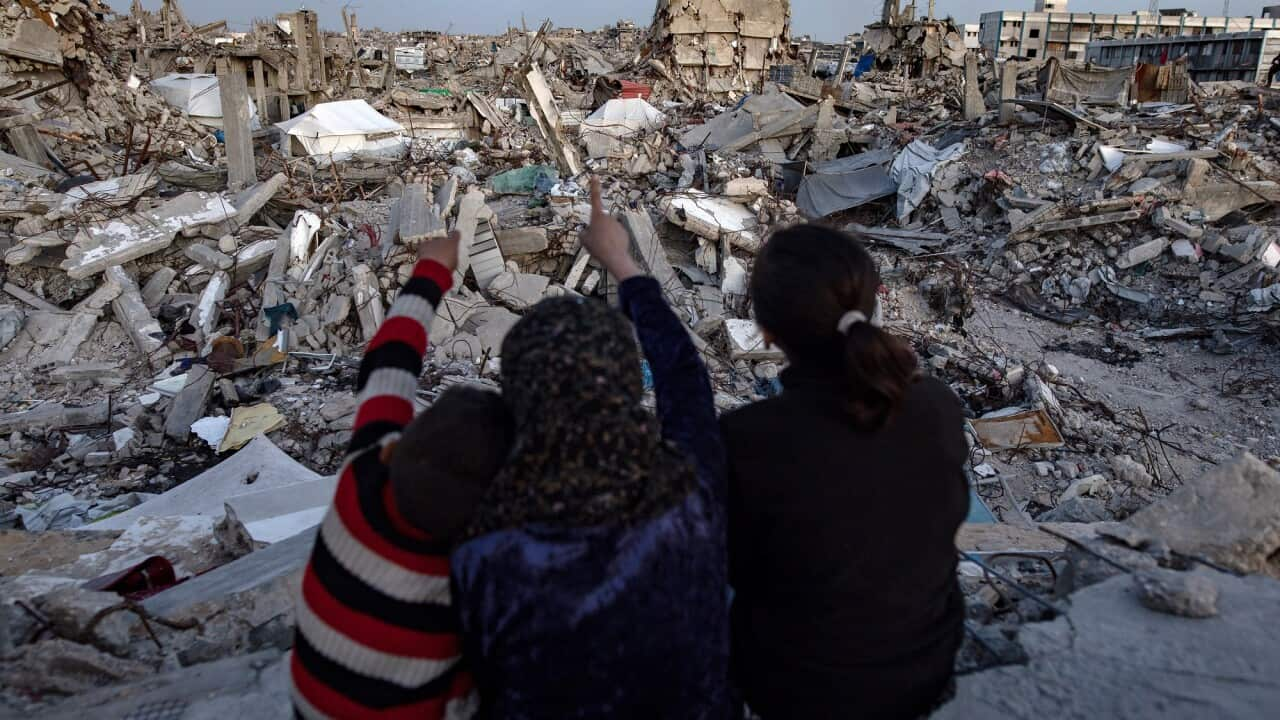TRANSCRIPT
Thousands of protestors have pushed back against the rise of the ultra-conservative Alternative fur Deutschland, or AFD party, ahead of this weekend's German elections.
Their unease reached new heights when Friedrich Merz - the leader of the Christian Democratic Unity party, or CDU, who polls tip to be the country's next Chancellor - accepted support from the AFD for a controversial anti-immigrant bill.
It broke a taboo on cooperation with the AFD, rooted in Germany's Nazi past.
Demonstrators say they are worried the rightward political shift will open the doors to racial vilification.
Flinders University Professor Matt Fitzpatrick has published widely on German culture, history and politics.
He says the tone of politics has changed since longtime leader of the CDU, former chancellor Angela Merkel retired in 2021.
“The motto was always, to the right of the CDU was only darkness. That is, there is nothing to be countenanced to the right of the CDU. But it appears that under the new leader, Friedrich Merz, who is keen to distance himself from the centrist policies of his predecessor Angela Merkel, that he is less reluctant to use the arguments of the far right in his own campaigning.”
The strategy has also created space for more challengers from the left.
Recent polls show Mr Merz' willingness to accept support from the AFD provided a bounce for one smaller party, called Linke.
Amidst the backlash, Mr Merz has moved to quell concerns he would enter a coalition with the AFD to form government.
"I can assure voters in Germany very clearly of one thing: we will not work with the party that calls itself Alternative for Germany — not before, not after, never.”
Mr Merz says the party stands against everything that has built Germany up in recent decades, including membership of NATO and the E-U.
AFD party leader and candidate for German chancellor, Alice Weidel, has denied her party plans to depart the E-U.
"We are not calling for a withdrawal from the European Union. We are saying quite clearly that the EU is exceeding its reach. And we need the EU to reduce its power, because the EU simply issues regulations.”
Her party may have the opportunity to put this case.
One recent sign of the AFD's ascendancy came when the party claimed the second highest number of German votes in E-U parliamentary elections last year, after the CDU.
In a national political system where governments are often comprised of complex coalitions, rather than a single party, this points to the possibility of significant power in the near term.
Professor Fitzpatrick says leaders' promises not to work with the AFD aren't enough to appease those concerned with the rise of the hard right.
“The deep unease comes from the sense that you don't need the AFD to be part of the government for any of their policies to come into legislation in the future.”
It's a concern that Sydney resident Ulrike Zimmermann shares.
She's a dual citizen who's live in Australia for 25 years, and says this election is more important than ever in light of rising polarisation.
“That is, in and of itself, regardless of what the Bundestag will look like, a kind of a danger, because it invites extreme views on either side, and it is detriment to working together to finding a compromise. it was hard enough under the current coalition that weren't so far apart, but imagine a strong right and a strong left and what that democratic debate will then look like.”
Ms Zimmermann worries about how the AFD could influence policy in a wide range of areas, like climate change and education, but she sees immigration as the key bellwether.
Ms Zimmermann stresses that she doesn't downplay the horror and fear caused by a spate of terror attacks impacting Germany in recent years:
“But you have to have a nuanced debate about what that means in real life, and not to say, okay, well, no more migrants at all, no more refugees at all. they're all bad. You know, that's just a kind of a black and white thinking that tries to find easy solutions where there are none to be had. Every country struggles with that very same problem, and no country has found the ideal answer, but to lose our humanity for political gain is absolutely, fundamentally wrong in my book.”
Incumbent German Chancellor and leader of the party which polls put in third place heading into this weekend's election, Olaf Scholz has taken a more moderate line on migration and refugees.
"And at the same time, it must be the case that a country that is open, that offers protection to refugees, for example, and should continue to offer protection in the future, always has the management of irregular migration under control. And that is something that I am committed to ensuring that the numbers are manageable.”
The management of social issues is another concern, with LGBTQI+ communities fearful of what more power for the AFD party would mean, despite the fact leader Alice Weidel is openly gay.
This audience member challenged Ms Weidel at a recent leaders debate.
"When I look at your election program, I'm afraid for my future. I am homosexual and I am scared. By the way, you should be scared too.”
A paradox, perhaps, that points to the broader contradiction which underwrites this election.
If the polls are correct, the AFD will garner the second largest count of votes when Germans head to the polls this Sunday local time.
The pro-democracy protestors behind the backlash against AFD may wake up on Monday to find that democracy has delivered the party significant power.
Still, Ulrike Zimmermann is glad the protests were staged.
Her school history lessons are now front of mind.
“We all learned about how quickly democracy can be dismantled, and the case in point being under, you know, Nazi Germany, under Hitler, it didn't take a lot. It took a few disgruntled people. It took a lot of other people taking their eyes off the ball. And you know, within, you know, very short period of time of a couple of months, Germany, the Weimar Republic back then, turned from a struggling, vibrant democracy, to a dictatorship, and all the horrors that came with it.”













